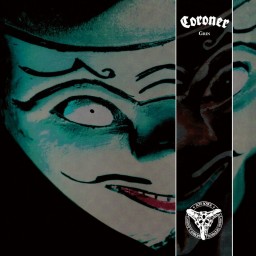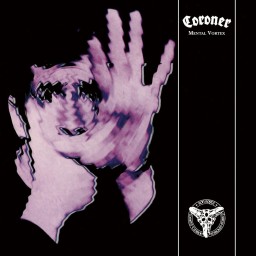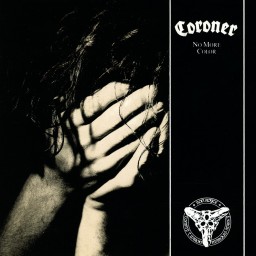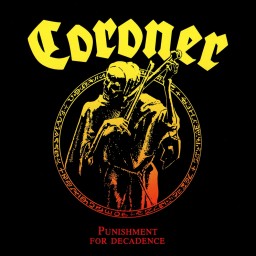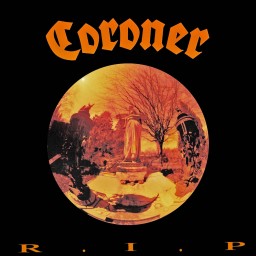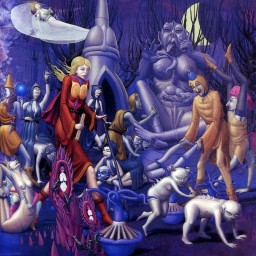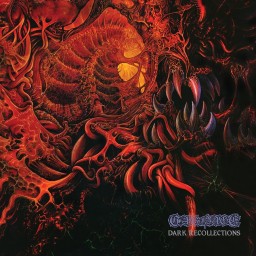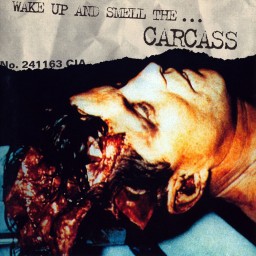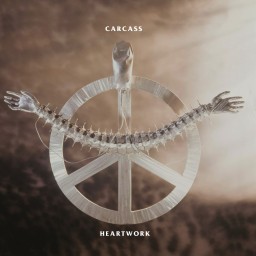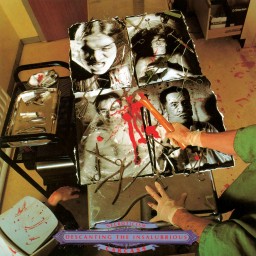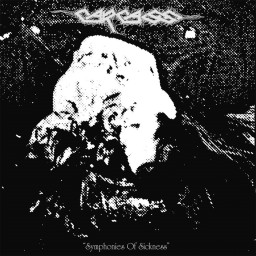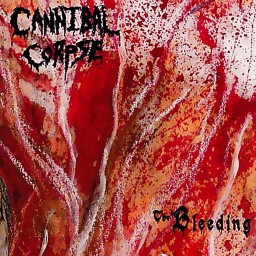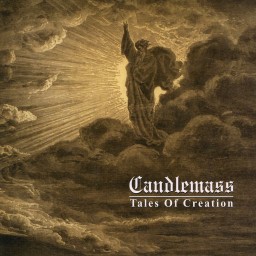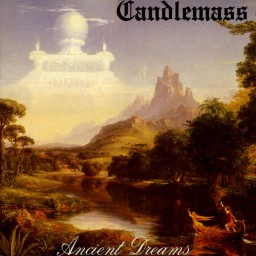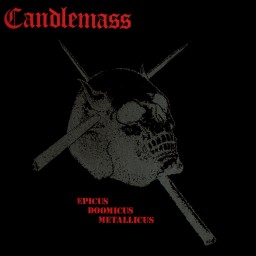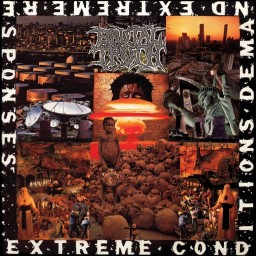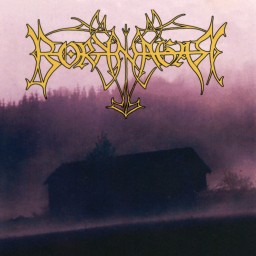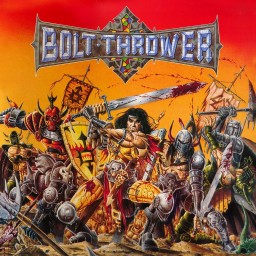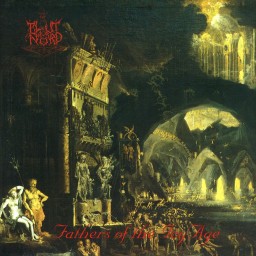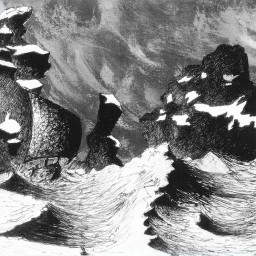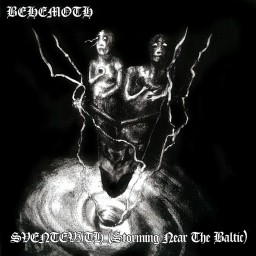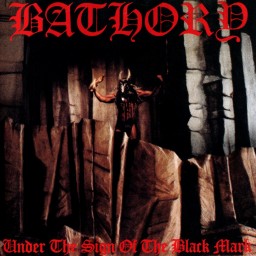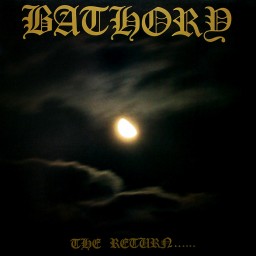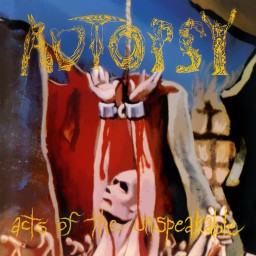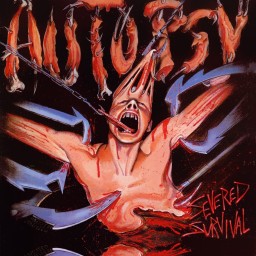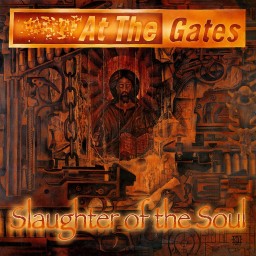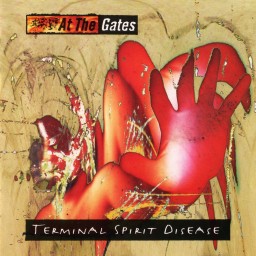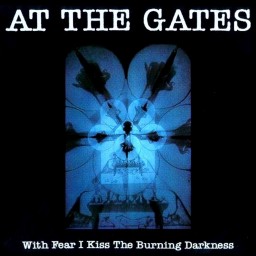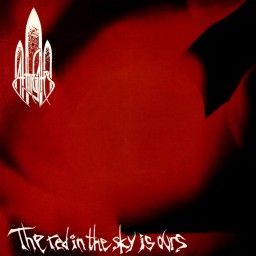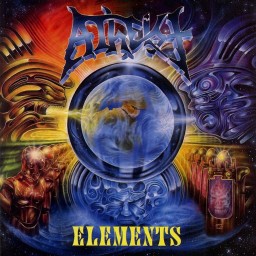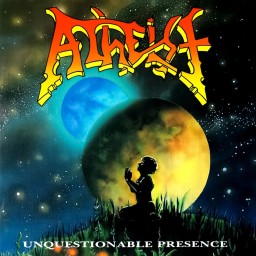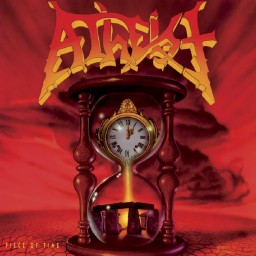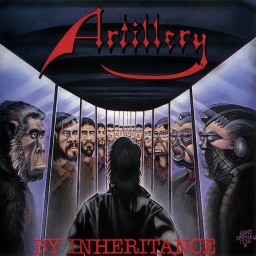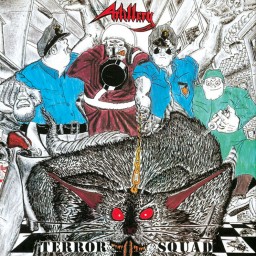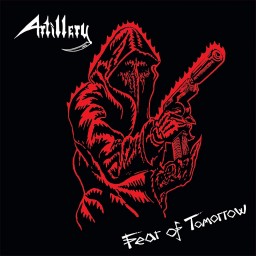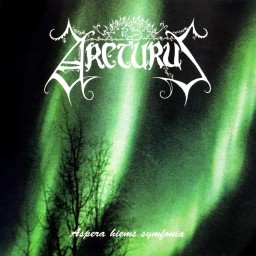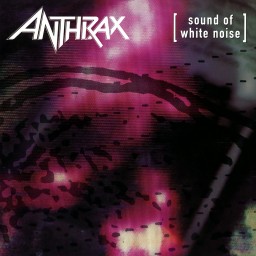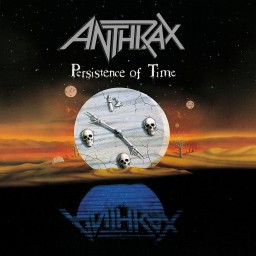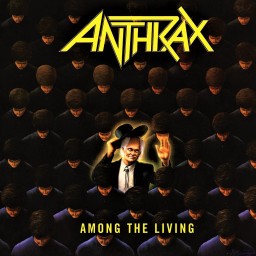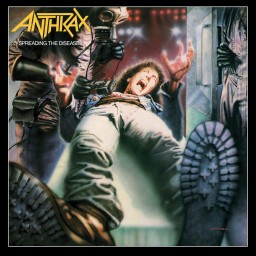Ben's Reviews
Massively underappreciated and ambitious album. Coroner went out in style!
So, it appears there are a stack of fans below that consider Grin to be the worst Coroner album. I couldn't disagree more! This album is a simply wonderful release and one of the very best by these Swiss legends. In fact, I'd probably say that this is my personal favourite! Yes, it's not as consistently shredding as earlier releases. Yes, the band decided to spend more time in each track, with most going over the six-minute mark. But if you give this album the time of day, it rewards massively!
Things kick off with two of the more aggressive tracks with The Lethargic Age and Internal Conflicts. Both are great, exciting pieces that will get your blood pumping with powerful drums and killer riffs. But then things slow down and become far more expansive for most of the rest of the album. Tracks such as Serpent Moves, Paralyzed, Mesmerized and Host may at first seem more simplistic due to their more relaxed atmosphere and lack of metallic edge, but the song writing is pure gold. Each track has multiple levels and themes which the band revisit and build on over their course.
The star of the show is undoubtedly Tommy T. Baron. His guitar performance is simply exquisite, and I can honestly say that the leads on this album are some of the absolute best I have ever heard. I also think this is vocalist Ron Royce's best performance and while he never had much variety in his style, he manages a level of conviction and strength on this album that outdoes anything prior.
I could crap on for ages about how good this album is but seriously, don't let the negative reviews below deter you. If you enjoy Coroner, then I can only assume you enjoy the progressive, technical aspect of their music (that's what makes them so great after all!), and Grin is by far the band's most ambitious work. It's not a failed experiment. It's a huge album that requires multiple listens for it all to sink in, and I don't have too many others that match it for sheer intelligence and talent. Such a shame they split after this, but at least they went out with a bang. Highlights are The Lethargic Age, Internal Conflicts, Paralyzed, Mesmerized and Grin but it's all superb.
Genres: Groove Metal Progressive Metal
Format: Album
Year: 1993
Coroner are one the most underrated bands in metal. Every album they released was gold and Mental Vortex is one the many highlights of their too short career. This album fine-tuned what was already a great technical thrash metal sound and upped the song writing to near perfection. At first listen, it would be easy to write these tracks off as being simplistic as they are generally mid paced, easy listening style thrash metal. But there are a whole bunch of jaw dropping riffs and Tommy's lead work is second to none (and I mean that!). The solos on this album are some of the very finest I've ever heard, managing to be technically genius while completely memorable and unobtrusive to the solid tracks beneath. I can't praise him enough, so I'll stop trying.
Opener Divine Step is the fastest track on the album and gets the blood pumping immediately. A multitude of cracking riffs get things underway and the album never really drops the ball until I Want You, which is incredibly a Beatles song. It's not that this track is bad either, as Coroner manage to give it a total overhaul in darkness and heaviness. It just stands out like a sore thumb as being a completely different mood to the rest of the album, which is why I generally hate covers. Other highlights are Son of Lilith, Semtex Revolution, Metamorphosis and About Life. Not to be missed if you enjoy technical thrash metal that's not afraid to explore the slower, less chaotic realms of the genre.
Genres: Thrash Metal
Format: Album
Year: 1991
More solid thrashing goodness from these Swiss legends. There's a step up in quality from their already great previous albums on No More Color. I've always enjoyed the formula these guys have. While this formula is simple at times, the musicianship certainly isn't. Ron's Tom Warrior like croon fits perfectly over these catchy, yet technically awesome tracks. Once again, it's Tommy Baron's guitar that stands out for me. His rhythm and lead work on here are stunning, while never crossing over into wanky showmanship.
Die By My Hand, Read My Scars and Last Entertainment are some of the finest tracks on this release, but the whole album is consistently enjoyable. Coroner always have been an extremely underrated band and No More Color is one of the highlights of their career. I'm not sure it's my favourite, but it's right up there!
Genres: Thrash Metal
Format: Album
Year: 1989
After R.I.P. proved that these Swiss thrashers could write technical and entertaining thrash metal, the pressure was on to come up with something special. I think they managed to up the ante when it comes to technicality, while managing to keep the song writing well and truly in control, which is an impressive feat. Once again, Tommy's guitar work is astoundingly brilliant, and he always seems to do it so easily. I've always enjoyed Ron's vocals even though they don't stand out as being overly impressive technically. They just fit the music so damn well I guess and he's always intelligible, which is certainly not always the case with metal.
Absorbed, Arc-Lite, Skeleton on Your Shoulder, Shadow of a Lost Dream and The New Breed are all great tracks but it's Masked Jackal that highlights the album in my opinion. Taking everything into account and after all this praise, I'm still only going to give Punishment For Decadence 4 stars. They would release even better albums after this and while it's consistently entertaining throughout, I always get the feeling that they could do something even more amazing. If you're into thrash metal but like things on the technical side rather than the straight-out brutal side, then Coroner are not to missed!
Genres: Thrash Metal
Format: Album
Year: 1988
I've always been a fan of Coroner's later albums but hadn't spent too much time with this debut album. Over the last couple of weeks, I've given it quite a few listens and I have to say it's in the same league as everything else they produced in their career. The production may be a bit less clean, but the musicianship and song writing are just as great.
The main thing that comes to mind when describing this band is pure technical musicianship. Even at this early stage, they were writing progressive, technical thrash that was quite different to everything else around. Tommy T. Baron's guitar work is simply jaw dropping at times. He was one of the very top guitarists in metal and from video footage I've seen, seemingly did it easily.
When Angels Die is one of my absolute favourite Coroner tracks and Reborn Through Hate, Nosferatu and Fried Alive are also up there. The album does have a mid-section that drops off slightly with the title track and Coma not really doing a lot, but the rest is class. For anyone into the more technical thrash metal out there, this is recommended.
Genres: Thrash Metal
Format: Album
Year: 1987
There are a lot of things that I love about Cathedral's debut outing. Firstly, the artwork is brilliant and completely messed up! Every time I look at it, I find something interesting I haven't noticed before. As for the music, this is extremely slow, heavy doom metal and by far Cathedral's heaviest album. I really enjoy tracks such as Ebony Tears, Serpent Eve and Reaching Happiness, Touching Pain. They created such a dark, weird atmosphere and Lee's vocals are perfectly bizarre. These guys were also not afraid to experiment with little touches of flute, acoustic guitars and keyboard added to the mix. It was a completely unique sound back in 1991, and while borrowing heavily from former doom bands, took everything to a new level of doominess. I can't think of an album prior to this one, with the exception of Winter's Eternal Darkness album, that explores to these depths.
I’d like to give it a high rating, but I just don't love Forest of Equilibrium all the way through. Most of the time the slowness works in its favour, but occasionally it causes me to drift off. I'm a massive fan of funeral doom (which this album totally influenced) and so it's not simply the style that loses me. A couple of the longer tracks just don't keep me interested all the way through, and I don't think I enjoy Cathedral's forays into stoner and heavy metal as much as when they concentrate on crushing doom. I guess I don’t enjoy where this band went with their music after this release and there were already signs of what was to come. Overall though, this is an important and influential album that for many is an absolute favourite. For me, it’s a good listen, but I think I enjoy the darker bands that were influenced by it more than the album itself.
Genres: Doom Metal
Format: Album
Year: 1991
Carnage contained Matti Karki (vocalist of Dismember), David Blomqvist (guitarist from Dismember) and Fred Estby (drummer from Dismember), so it's not all that surprising that Carnage sounds an awful lot like Dismember. When you add in the fact that the fourth member of the band was Michael Amott (on bass and guitar) from both Carcass and Arch Enemy infamy and you'd assume this album would be an absolute certainty for classic status. But while it's a decent example of early Swedish death metal, I can't say that Dark Recollections is as entertaining as albums from Entombed, Dismember, Unleashed or Grave, all of which came out around this time.
There are just not enough catchy hooks or crushing sections to get me coming back for more. The production is perfectly adequate, and they nailed the guitar and drum sound, but Dark Recollections just doesn't do enough to make it essential in my opinion. It's a little difficult to pick highlights as not many tracks stand out, but I do enjoy Gentle Exhuming (you gotta love that title), Blasphemies of the Flesh and the title track. Plus, the cover artwork is cool (by Dan Seagrave of course!!!).
Genres: Death Metal
Format: Album
Year: 1990
There are some great rare gems here, but numerous versions of the same tracks was really unnecessary. Still, it's Carcass!
Compilations are often hit and miss affairs and they seem to take on two formats. Firstly, there's the "best of" compilation that attempts to place all the best tracks a band has released on one disc while spanning their entire career. This normally ends up being a great starting point for newcomers, but a bit superfluous for long-time fans. Secondly, there's the "unreleased tracks" compilation that attempts to offer new material for fans desperate to get their hands on more but is probably the last place a newcomer might want to start. Wake Up and Smell the Carcass most definitely fits into the second category which is why I was looking forward to getting my hands on it. I love most of the band’s work and followed them through their evolution through grindcore, intense death metal, melodic death metal and then finally the death n roll entity that was their swansong (sorry). So, what do these remains have to offer?
Well, there's 17 tracks all up so there's lots to talk about. It runs in reverse chronological order which means it all starts with five tracks that didn't make the cut for Swansong. Personally, I really don't like the direction Carcass took for that album. They entered the sort of territory bands like Entombed and Dismember had already delved into, being rock based metal that leaves almost all semblances of death metal behind. The musicianship is basic which is such a shame for musicians of this calibre and the riffs lack any sort of power. That being said, the five tracks here are just as good as anything on Swansong and have a little bit more aggression to them which suits me fine. Each track has its moments, but I'd say Emotional Flatline is the pick of the bunch.
Tracks 6 to 9 are live recordings which were recorded for a Radio 1 Rock Show in 1994. Any Carcass fan will know and enjoy Buried Dreams and No Love Lost off Heartwork and these recordings are quite nice. It's particularly cool how the band kicked off No Love Lost with the opening section of the classic Ruptured in Purulence before seamlessly transitioning. The other two live tracks are Rot 'n' Roll and Edge of Darkness which is a bit strange considering both tracks appear in studio form elsewhere on the compilation. I know it's a case of filling this disc with every unreleased track they could find, but surely listening to these tracks 2 times in quick succession isn't going to please too many fans out there. Nonetheless, they all sound pretty good and the band perform flawlessly.
Tracks 10 and 11 are This is Your Life and Rot 'n' Roll off the Heartwork EP released back in 1993. It's rather strange that the band then went on to release a full-length album with the same name which is certain to have confused a few people out there. This is where Wake Up and Smell the Carcass gets interesting for me as these two tracks are well worth checking out. They do suggest that the band was already considering moving into more rocking waters prior to the release of the classic Heartwork album, but they're still kicking enough to please the death metal fans. Rot 'n' Roll doesn't have quite as much effect since we just heard it three tracks earlier but can't be criticised when it comes to quality. Jeff Walker's vocals still contained that rabid edge that was sadly missing for the Swansong performances.
Tracks 12 to 14 are undoubtedly the highlight of the compilation. The Tools of the Trade EP was recorded around the time of and with the same line-up as Carcass' masterpiece Necroticism - Descanting the Insalubrious, so there was never going to be any doubt about the quality of these tracks. The original EP also included the completely astounding Incarnated Solvent Abuse but the three otherwise unreleased tracks here are also great. After all the melodic and rocky metal in the first half of the compilation it's damn refreshing to hear the dual vocal attacking, completely shredding and blasting death metal that Carcass did so well. If you've never managed to get your hands on the EP then this compilation is probably the easiest way to do so. Awesome stuff!
Tracks 15 through to 17 were originally recorded for label compilations back in 1989. Genital Grinder II and Hepatic Tissue Fermentation for the Pathological Compilation which also included bands like Godflesh and Napalm Death. Genital Grinder II is a short instrumental that kicked off the compilation in style whereas Hepatic Tissue Fermentation really showed what Carcass were capable of at this early stage with thick, dirty riffs and sick guttural vocals. Unfortunately, its effect is once again diminished due to it appearing literally 3 minutes after the re-recorded version found in the Tools of the Trade EP. I'll partly forgive them this time round as it's quite fascinating to hear what good production and a slightly different approach can do to the same material. Finally, Exhume to Consume was originally recorded for Earache's famous Grindcrusher compilation. This release was really a who's who of grind including Terrorizer, Repulsion and Napalm Death to name a few. Exhume to Consume is a great track of Symphonies of Sickness and this early version is damn putrid to say the least.
So, it's clearly apparent that Wake Up and Smell the Carcass has a heck of a lot of material to delve into. There's no doubt that it successfully makes some rare and at times excellent material available for fans, but the repetition of tracks was unnecessary. Just a little bit of restraint would have lowered the 76-minute running time and made for a far smoother listen. I also can't ignore the fact that the latter material just doesn't work all that well and just shows why the band called it quits in the first place. I won't say you shouldn’t get the album if you're a big fan, but if you already own the Heartwork and Tools of the Trade EPs, this really doesn't have much value.
Genres: Death Metal Grindcore
Format: Compilation
Year: 1996
An extraordinary band that pushed the boundaries of melodic brutality...and succeeded brilliantly!
Carcass' evolution didn't always please everyone. Beginning their journey as a rather raw (and pioneering) goregrind outfit on Reek of Putrefaction, the band added more of a death metal element to Symphonies of Sickness, before leaving the grindcore behind completely on the brilliant Necroticism release. Heartwork finds the band adding a hefty dose of melody to proceedings without letting go of the death metal backbone. Throughout each of these steps there were unhappy fans, disappointed that the band was moving away from the style they personally enjoyed, but there's no doubt that on each occasion they gained masses of new fans in the process.
I think Heartwork is the stage where this fan (at first anyway) found himself a bit disappointed with the new direction. Necroticism is one of my all-time favourite albums and most definitely one of the finest death metal releases ever recorded. To find my beloved and brutal Carcass shedding the blastbeats and toying with melodies was reason for more than just concern and I must admit that I almost wrote this album off after just a couple of listens. But once I settled in and gave Heartwork some time I not only found it growing on me, but I also started to think of it as a fantastic album itself that doesn't really have any flaws.
One of the differences to be found on Heartwork is that Jeff Walker is now the sole vocalist. His raspy yet powerful delivery no longer joined by the varying styles of the other members of the band. As always, Steer and Amott produce fantastic riff after fantastic riff which, while certainly not as vicious as on previous albums, are still shredding enough for any fan of death metal. Ken Owens’ drumming was always one of the best things about Carcass and he still gets to show his stuff on Heartwork, even if the intensity of the work has been lessened somewhat. Carcass were one of the tightest bands imaginable by this point and each member played a huge role in the result.
Highlights for me are the title track, Embodiment, Blind Bleeding the Blind and Death Certificate, but there are no bad tracks to be found on this classic. It's a case of a band that were already extraordinary having the guts to try something different and still managing to come up with an incredible product. Unfortunately, the same cannot be said for their Swansong just a few years later. But that's another story...
Genres: Death Metal
Format: Album
Year: 1993
Necroticism is simply put, one of the greatest albums in death metal history. Carcass had already made heads turn (and stomachs) with their earlier influential grindcore releases, but second album Symphonies of Sickness contained a less chaotic, more death metal structured approach that hinted at what was to come. Everything on this album is perfect in my opinion and I wouldn't change a thing. Michael Amott and Bill Steer on guitar is a match made in heaven. The riffs on every track are pure death metal gold with melodic, brutal and grinding sections all over the place. The leads are first class and extremely memorable which is rarer and rarer these days. Drummer Ken Owen is just as significant to this album though. His blast beats are fantastic as are his use of double bass kicking. And then there's the dual pronged attack of vocalists Steer and Jeff Walker, one with a guttural, vomitus growl, the other with a raspier decipherable approach. The atmosphere is high throughout due to the music, lyrical content, imagery and sound recordings between tracks all thematically (i.e. forensic gore) synchronised.
It's the type of album where it seems stupid to pick highlights as every track is great, but then Incarnated Solvent Abuse (one of my very favourite tracks of any genre or band) and Corporal Jigsore Quandary stand out for me. Carcass have been hugely influential for literally hundreds of bands (i.e. Aborted, Impaled etc) over the years, but I have to say it's a case of forever imitated, never bettered. Necroticism has stood the test of time and stands head and shoulders above all the gore themed death metal bands that have worshipped them ever since its release. Essential for anyone into extreme metal and with the new dual disc digipak containing the Tools of the Trade EP and a 30-minute documentary, there's never been a better time to be shredded by Carcass!
Genres: Death Metal
Format: Album
Year: 1991
Carcass' third and fourth albums, Necroticism and Heartwork are two of the very finest albums the world has ever seen. It's quite difficult to review the rest of their discography due to the excellence of those two pieces of work. But it's so important to look back at their humble beginnings, especially when one considers how damn original they were at the time. They clearly progressed and evolved with each release, going from brutal, sludgy grindcore (Reek of Putrefaction) and ended up with some sort of cleanly produced, death n roll (Swansong).
Symphonies of Sickness sits in between that crappy sounding yet somehow entertaining debut and the completely peerless death metal of Necroticism. It's still underproduced, but somehow the sound works completely. The imagery, the lyrics, the whole tongue in cheek experience, just wouldn't work as well if this wasn't raw and impenetrable. And nothing else had sounded this sick and twisted back in 1989. Along with Autopsy, Carcass created a whole new genre of metal, and one that is still going strong today. The band have recently reformed (well, Jeff Walker, Bill Steer and Michael Amott have recruited Daniel Erlandsson to make a new Carcass) and it will be interesting to see what they come up with next.
All three band members take on vocal duties on nearly every track. It's amazing how different Bill Steer and Jeff Walker's vocal styles were and yet how perfectly brutal each of them sounds. Steer's guitar riffs are amazing, and his style has been copied repeatedly in the past 20 years. Highlights are Reek of Putrefaction, Exhume to Consume, Empathological Necroticism and of course Swarming Vulgar Mass of Infected Virulency. You got to love those titles. Carcass rocks!
Genres: Death Metal Grindcore
Format: Album
Year: 1989
More accessible than their previous releases, but still wickedly intense. One of their best!
Cannibal Corpse are one those bands that people love to hate. I heard recently that these guys have sold more albums than any other death metal outfit, which is partly due to their long career (11 full length studio albums and counting), but also due to the band having a huge fanbase. There are many out there that dislike the band solely for their rather disgusting lyrical content and imagery, and there are stacks that love them for the same reasons. Personally, I think death metal really isn't the sort of thing you should be playing to your family at gatherings. If you can't handle a bit of gory content, then perhaps this isn't the genre you should be subjecting yourself to. That being said, let's face it, Cannibal Corpse aren't really being serious when they suggest you pick up an axe and kill everyone you meet, and I'm fairly certain they don't practice penetrating their wives and girlfriends with sharp objects.
Anyway, the fact is that Cannibal Corpse know how to write intense death metal, filled with great hooks, brutal vocals and a level of excitement that many other similar bands could only dream of. The Bleeding was their last album that contained Chris Barnes on vocals, and it stands out as having a different approach than the preceding releases. Firstly, the riffs are a bit less chunky and take on a more thrashier style, but they're also a lot groovier and almost mesmerising at times due to their catchy yet crushing structures. Secondly, Chris' vocals are decipherable, which can't really be said for any previous material, which contained seriously guttural, low end growls. I think his performance on The Bleeding is the highlight of his career including anything he would produce for the shockingly awful Six Feet Under. The musicianship in general is damn good throughout, but it does pale a bit when compared to bands like Suffocation.
It's obvious from all the above that I think Cannibal Corpse (and this album) are more entertaining than a lot of people give them credit for, but I guess I still can't say that The Bleeding is a five-star type of album. There are some awesome tracks such as Staring Through the Eyes of the Dead, Fucked With a Knife, Stripped Raped and Strangled and the title track, but I'm not sure any of them reach the excellence of, for example, Hammer Smashed Face. Overall, The Bleeding is a consistent album that contains some great riffs and masses of intensity. It's more accessible than a lot of their other albums so if you're new to the band, this is probably not a bad place to start. Certainly one of their better albums!
Genres: Death Metal
Format: Album
Year: 1994
Candlemass were incredibly consistent during the late 80s. Releasing 4 albums, one a year, from 86 through to 89, with each one a fine example of doom metal and a thoroughly enjoyable album. Tales of Creation is the last of this memorable run. While I certainly don't think it's the best of their early releases (that's the debut in my opinion), it is a bit of an improvement over Ancient Dreams, which tended to be a tad lacklustre at times.
Tales of Creation is quite a complete album, with short passages connecting the tracks together and a theme of creation running through its entirety. What's strange about it is that while obvious effort was put into creating a "whole" experience, some of the tracks themselves appear incomplete or just don't seem to fit. Somewhere in Nowhere for example just seems to be getting going with some exquisite lead work at about the three and half minute mark, for it suddenly to just fade out into nothingness. Into the Unfathomed Tower finds the band switching into a shredding heavy metal band for a few minutes of un-Candlemass like wankery that also doesn't fit the feel. I can understand the band wanting to break out and do something different, but I enjoy Candlemass for what they are. My final complaint is that while Under the Oak is an awesome track from the debut Epicus Doomicus Metallicus, re-recording it and placing it at track four on Tales of Creation wasn't a great idea. The fact is Messiah's version seems completely lacking in passion compared to the original. It just makes me want to go back and listen to the first album.
So obviously I have some issues with the album that stop it from being a classic doom metal moment, but overall, it's still an album worthy of my collection. Dark Reflections, The Edge of Heaven and Through the Infinitive Halls of Death are all typically epic doom with all the band in fine form. But it's the closing title track that really impresses, finishing the album with what I consider to be one of the very best Candlemass tracks. If you're new to the band, pick up the first couple of albums first, but don't ignore this one. It's Candlemass after all!
Genres: Doom Metal
Format: Album
Year: 1989
From looking at the reviews from others on here, it appears I'm not alone in my feelings towards this album. It's a very solid Candlemass release, but it doesn’t match either of the preceding releases, which is why it tends to be overlooked. But if you take the album as it is, there's a lot of enjoyment to be had. The blueprint had already been set previously and perhaps this third album is just following the rules a bit too much, without breaking new ground, to be considered a classic.
Mirror Mirror is typical Candlemass and probably my favourite track on Ancient Dreams. All the other tracks, except for Bearer of Pain and Epistle No. 81, which are a bit average, are all quite decent without being exceptional. But I think it would be harsh to write the album off for being consistently good, if not as amazingly brilliant as Epicus Doomicus Metallicus and Nightfall were. The slightly middle eastern sound that raises its head occasionally is interesting and they manage to move things from monstrously slow (and doomy) to upbeat (and still doomy) with ease. I'm going to stick up for Ancient Dreams and give it 4 stars as it's very worthy of any doom metal fan's attention.
Genres: Doom Metal
Format: Album
Year: 1988
Nothing before it had come close to the epic doom that is Candlemass! Trouble, Witchfinder General, St Vitus and Pentagram had all dabbled in the magic that Black Sabbath had created more than a decade earlier, but it was Candlemass that absolutely nailed it with their debut Epicus Doomicus Metallicus.
A fantastic production showcases the pounding slow drums, the monstrous riffs and Johan Langquist's incredible vocals. Favourite tracks for me are the incredible Solitude, Demon's Gate and well...all of it! Being a massive fan of death / doom bands such as My Dying Bride and Saturnus as well as funeral doom such as Esoteric and Shape of Despair, it took me a long time to catch on to the more traditional form of doom metal, but I'm seriously happy I did. Doom on!!!
Genres: Doom Metal
Format: Album
Year: 1986
I can't say I like grindcore all that much, but this is plain awesome! Brutal Truth managed what so many other grindcore bands have failed to achieve and they did it way back in 1992. They made a constantly interesting album filled with variety in a genre known for being fairly one dimensional. Of course, there are heaps of grindcore clichés all over the place with combined guttural and screaming vocals, tracks that go for about 5 seconds, lyrics about politics etc. etc. But then there are also stacks of great doomy riffs and tracks like Time, that contains 6 minutes of extremely well-structured song writing as opposed to endless blasting.
Brutal Truth know exactly how to get you pumped up. They're happy to dwell in the dark and heavy depths before pumping into full on battering chaos. Kevin Sharp's vocals are perfect for this style with his death growls being the epitome of awesomeness. Scott Lewis' drumming is just about inhuman. But it's Brent McCarthy's riffs that really float my boat. Check out Birth of Ignorance, Denial of Existence, Time, Walking Corpse and Wilt for simply cracking deathgrind. If you're even slightly interested in the more extreme side of metal, go get this album. You won't regret it!
Genres: Death Metal Grindcore
Format: Album
Year: 1992
An immense, varied and passion-filled black metal album. Borknagar deserves more recognition!
How many times have we heard the dreaded term "supergroup" over the years? So often when that word is thrown around the result ends up being entirely underwhelming. It's as though the individuals involved figure it really doesn't matter what they release as it will sell regardless. Sadly, it normally does! Borknagar are a perfect example of when a "supergroup" really puts the effort in and creates something truly special. Any band containing Garm on vocals (Ulver), Infernus on bass (Gorgoroth), Grim on drums (Immortal) and Ivar Bjørnson on keyboards (Enslaved) sure has a lot to live up to and this debut doesn't disappoint in the slightest. But I think there's one particular reason why this band is so much more than just a side project and that's Øystein G. Brun. While he'd previously performed for death metal band Molested, Borknagar is his pride and joy. He's the man behind the band name (which is based on a myth about a man who climbed a mountain in Scotland) and really, the man behind the band itself.
The band would on later albums move into more progressive metal realms, but on this debut, they perform raw Viking influenced black metal. When I say raw, I'm not talking about Darkthrone minimalism here. It's an extremely intense production where everything seems to be turned up to the max. Garm's vocals are seriously throat ripping, Grim's drumming forcefully brutal and Øystein's riffs are heavily distorted throughout, yet somehow despite such a monstrous sound, everything is clearly audible independently. It's particularly surprising that the bass and keyboards get a look in at all, but their presence is felt at just about all times. Speaking of keyboards, I always assumed that Ivar Bjørnson was contributing guitars to Borknagar as well as the symphonic aspects buy my research tells me that's not the case. His keyboard work here is brilliant though in that it never takes centre stage but always adds dramatically to the atmosphere of the album.
Borknagar only contains five full black metal tracks. All are lengthy and contain stacks of beautiful musicianship and passion galore. The riffs and acoustic passages are what give the album its Viking flavour and while that term is thrown around too much in metal these days, I really do get a sense of battles from a distant past when listening to this. Garm's vocals are more consistently aggressive than on Ulver's Bergtatt debut but he still adds his wonderful clean vocals to proceedings with great success. He really is one of the very great vocalists in the world of metal in my opinion. The other five tracks are instrumentals of varying styles, but instead of merely filling the gaps between the meatier compositions, these are fascinating and beautiful. Ranging from purely electronic to purely acoustic, they make for a varied, captivating listen and give more presence to the surrounding black metal.
Borknagar's debut is an album that I feel deserves more praise than it receives. It's not merely the pure black metal album that they created before expanding their influences. It's the best release in their discography! Anyone into black metal and particularly those that enjoy the more Viking themed entities should track this down immediately. I won't bother mentioning highlight tracks as they are all awesome!
Genres: Black Metal Viking Metal
Format: Album
Year: 1996
I was always going to love Bolt Thrower! Just look at that cover for starters! Any decent death metal band that utilizes great fantasy artwork and a theme of epic battles without falling into corny power metal territory is going to win my vote, and that's what Bolt Thrower have always been about. They may have moved that theme of war from ancient times and fantasy epics into modern day warfare, but the general atmosphere has always been the same. I was hugely moved by it as a teenager and it still gets me today.
And this is where Bolt Thrower really nailed their sound to go with the imagery. While Realm of Chaos was a decent album, and showcased these UK death metal veterans’ intentions, it's Warmaster where they really got things right. No-one else sounds quite like Bolt Thrower, with their extremely low tuned, heavy riffs, awesomely crushing drumming and Karl Willets unique and brutal, yet completely distinguishable vocals. They haven't really moved very far from this formula even 17 years later and who can blame them. They nailed it right here!
That's not to say this is a perfect album. It starts off incredibly well though with Unleashed Upon Mankind (love that intro!), What Dwells Within and The Shreds of Sanity getting things under way in fine form. There really aren't any bad tracks for the remainder of the album, yet probably only Cenotaph, War Master and Afterlife reach this high quality again. If I was going to nit-pick, I'd say the solos aren't all that special, but all up, this is a damn enjoyable death metal album from an extremely consistent band that would go from strength to strength over the next few years. Essential for any death metal fan!
Genres: Death Metal
Format: Album
Year: 1991
Excellent atmospheric black metal with some beautiful melodies to top it off.
I’ve only recently started checking out early Blut Aus Nord after admiring this French band’s 2003 album The Work Which Transforms God. The first part of this journey took me to their debut Ultima Thule which is a surprisingly entertaining piece of atmospheric black metal, complete with ambient sections and tortured vocals. The fact that many fans list second album Memoria Vetusta I: Fathers of the Icy Age as their favourite Blut Aus Nord album had me excited to take on the second stage of my belated induction. Yet despite these lofty expectations, I’m pleased to announce that Memoria Vetusta is easily as good as Ultima Thule and probably exceeds it by a small margin. But rather than a simple case of more of the same, Blut Aus Nord unleashed a rather different beast this time around, meaning both albums remain relevant and complimentary. It’s fantastic to experience three albums from the same band that sound so vastly different and yet all contain the same spirit within.
The main and most obvious change is the improvement in production. Ultima Thule had a lo-fi sound that somehow worked really well for the eerie electronics, cold riffs and distant screams. This time around all instruments contain far more power while still containing the wall of sound fuzz that helps rather than hinders black metal’s effectiveness. They also minimized the symphonic aspect that pervaded the debut. There are next to no ambient sections to be found on Memoria Vetusta and the keyboards are used far more sparingly, rarely taking centre stage. Yet the new emphasis on riffs is wonderfully complimented by some truly awesome melodies and leads that take their music to a whole new level. With a backdrop of thick distorted riffs, pummeling double bass drumming and evil snarling vocals, these exquisite clean melodies truly move the listener on some primal level. If my mind ever starts to wander while listening to the album, it is brought immediately back every time one of those beautiful sections kicks in.
The other aspect of note is the use of clean vocals. Just as Garm used to do with Ulver and Borknagar so effectively, Vindsval mixes Viking style chanting with the standard black metal vocals and it works brilliantly. The bass is audible for most of the album and I have to say it’s a bit odd at times. It’s not necessarily the sound that’s unusual as it is the upbeat performance of Ira Aeterna which is a little off-putting every now and then. But it doesn’t come close to ruining what is another superb album by Blut Aus Nord. It’s still not a perfect album by any stretch, but tracks like On the Path of Wolf…Towards Dwarfhill, The Forsaken Voices of the Ghostwood’s Shadowy Realm and Sons of Wisdom, Master of Elements are breathtaking examples of black metal done well. You can just start to hear some of the discordant riffs that would eventually make The Work Which Transforms God so beautifully warped and disconcerting. The thought that I’ve still got a few more of their albums to delve into makes me very pleased indeed.
Genres: Black Metal
Format: Album
Year: 1996
Blut Aus Nord's debut is a beautiful and immensely atmospheric black metal album.
Like many others, I first came across Blut Aus Nord with their The Work Which Transforms God album. Saying that I was blown away by that album would be an understatement. It's an immensely disturbing and moving album that sounds like it was recorded in another dimension. Going back through a newly found bands discography can sometimes be underwhelming, with the result often being that you discover a less mature version of the album that got you into the band in the first place. Thankfully, that hasn't turned out to be the case with Blut Aus Nord for two main reasons. Firstly, this debut album is excellent all on its own and secondly, Ultima Thule is not very similar to The Work Which Transforms God at all.
What we have here is atmospheric black metal that relies heavily on ambient passages, freezing riffs and seemingly distant, tortured shrieks. It's much more likely to cause your mind to escape into distant forests and icy landscapes than dive into an abyss of blasphemy fueled hatred like the aforementioned gem demands. Others have mentioned Burzum while describing this album and I can certainly hear that (particularly in the use of keyboards), but I think Satyricon's Dark Medieval Times needs a mention also, particularly the way the album switches (not always neatly) between grand, raw black metal and outside influences. The difference here is that Blut Aus Nord went for entirely symphonic elements, rather than the more acoustic work on Satyricon's debut.
The musicianship doesn't really draw your attention to it, which is a wonderful thing for any atmospheric black metal album. The band obviously cared nothing for technicality and instead opted for simple yet hugely atmospheric passages. Despite this simplicity, I have to say it's a captivating and at times unpredictable experience. Many tracks shift halfway through down an altogether different path, which at times can be jarring and frustrating, but each part is effective enough that you soon settle into the metamorphosing proceedings and just let it wash over you. The vocals are extremely raw and agonized and while a few reviewers on this site seem to dislike them, I find them utterly enthralling. Once again, the closest comparison would have to be Varg's emotional outbursts in Burzum and that can only be a good thing in my books.
The opening track The Son of Hoarfrost, Till I Perceive Biforst and The Last Journey of Ringhorn are the highlights of the album for me, but there's much to be enjoyed within all 8 tracks, including the ambient instrumentals. If you enjoy albums like Dark Medieval Times, Hvis Lyset Tar Oss and to a lesser extent the music of Drudkh, then you should hunt Ultima Thule down. It's by no means a perfect album but it's a consistently gripping and entertaining one.
Genres: Black Metal
Format: Album
Year: 1995
Not an amazing or groundbreaking album by any means, but Sventevith is solid, atmospheric black metal.
Behemoth were originally a rather raw black metal band, producing albums a long way removed from the rather clinical, polished death metal that they perform today. I must admit that while I do enjoy quite a bit of their modern material, I'd never really spent much time with this earlier incarnation of the band. I thought I'd change that and decided Sventevith might be a pretty good place to start. It turns out that this album is an entertaining piece of work, but I can't say that it's anything particularly original or amazing, and not something I will go back to all that often.
The first thing to state is that the production is very raw and the performance of the musicians a bit sloppy at times. But one gets the feeling that this unprocessed recording was exactly what they had in mind. As any fan of black metal would know, underproduced material can sometimes be the most atmospheric. With Sventevith, I find this statement to be only half true. There is indeed a fair amount of atmosphere throughout, but the riffs are a bit too weak in the mix so there's just not enough to hold onto. The decent shrieking vocals, the sloppy yet adequate drums and the simple yet effective keyboards all get plenty of volume, but I can't say I recall many of the guitar riffs after it's finished since they're just so remote.
It's not often that I would think that a black metal album could really do with better production, particularly one by Behemoth who I consider to be way over produced these days, but this is an instance where I think that rings true. In the end, I think Sventevith is an above average album that just doesn't do enough to be essential in any way. All this being said, Chant of the Eastern Lands, From the Pagan Vastlands and Forgotten Cult of Aldaron in particular are really enjoyable tracks and the numerous acoustic and keyboard instrumentals add nicely to the atmosphere. I look forward to checking out Grom next to see how they evolved.
Genres: Black Metal
Format: Album
Year: 1995
This is the album where Quorthon really hit his straps. The debut album, while being fairly raw, was pretty much the first real black metal album. The Return took things to an even dirtier, darker sound but I feel it lost out on the song writing side with much out it failing to hold my attention. But Under the Sign of the Black Mark turned everything up a notch.
The production is much better, the song writing has more variety and is much more memorable, and the level of aggression of tracks like Equimanthorn, Chariots of Fire and Of Doom... had simply not been reached before. Even the slower tracks such as Enter the Eternal Fire and 13 Candles are dripping with venom. Literally hundreds of black metal bands owe their existence to this period of Bathory's career.
I can't give it full marks as the album does have its flaws (Quorthon's leads still a bit dodgy, but at least they're short and sweet this time, and Bathory's finest moment is still yet to come.
Genres: Black Metal
Format: Album
Year: 1987
Bathory's debut album had already caused quite a stir in 1984. It took metal to a new level of darkness with evil imagery, satanic lyrics etc. I think it holds up well to this very day. Unfortunately, this second release has never managed to capture me in quite the same way. It has an even darker sound than the first one and Quorthon's vocals are even more evil sounding, yet there are hardly any memorable songs on here. Total Destruction is great and others such as Born For Burning and The Return of Darkness and Evil are decent enough, but the album seems to just roll by without grabbing my attention.
This is still an important and influential release, yet I feel it is the least in quality out of the classic Bathory black metal albums.
Genres: Black Metal
Format: Album
Year: 1985
Autopsy have always had their own sound. A combination of dirty (and I mean filthy) doom riffs and aggressive death metal that will test all but the most extreme music listeners. Acts of the Unspeakable is by the above definition more of the same. The sound is similar (though not as full) with all the ugliness intact and there's no way you could be listening to anyone but Autopsy at any stage of the album. Yet there's just something missing on this album that doesn't allow it to reach the heights of its predecessors.
The first thing to notice is that there are 18 tracks instead of the normal 10 to 12. As this suggests, that means the tracks are generally a lot shorter, with quite a few coming in under a minute. There's no build up or time spent creating atmosphere. A lot of these tracks are over before they've even begun, which is a shame because there are some good sections that deserved more time. As mentioned earlier, the production is also a little bit empty when compared to an album like Mental Funeral. There was a certain claustrophobia and weight to that release which is most certainly lacking from Acts of the Unspeakable.
But all this negativity doesn't add up to a complete failure. Autopsy are always enjoyable in some primal way and I can still spin this album and find some entertainment value. It's just that there's no way that I can label this an essential death metal album, which I most certainly can for the band's first two releases. All the best tracks are the ones with longer running times such as Your Rotting Face, Pus / Rot and Funereality, with a fair few of the other tracks passing by almost unnoticed. All up, a slightly disappointing release that's still able to raise a smile or two.
Genres: Death Metal
Format: Album
Year: 1992
I came late to Autopsy. I found it a little difficult to digest back in my teenage years when I preferred my metal clean and well produced. Over the years I've learnt to appreciate dirty, crushing, old school death metal and picked up on albums such as Severed Survival. And how gorgeously disgusting it is!
Chris Reifert left Death and formed his own band with the sole intention of creating a monstrously gory and filthy death metal band. And he succeeded beautifully! The guitar sound is always very full and distorted yet clearly audible. Chris' vocals are brutal and guttural. How he could ever do that while drumming is beyond me!
One look at that cover artwork and you'll get a fair idea what you're in for. The lyrics are gross, but it really doesn't matter as you generally won't understand anything he says. Highlights for me are Charred Remains, Disembowel and Ridden with Disease, but every track is enjoyable.
Genres: Death Metal
Format: Album
Year: 1989
Ignore the naysayers, Slaughter of the Soul is an aggressive and well-crafted masterpiece.
At the Gates' first releases didn't impress me much. Here was a band that could certainly write some decent riffs, had some excellent drumming and a vocalist that could tear your skin off from 100 metres away. But while they showed good enthusiasm and talent, they lacked focus to pull it off. Both The Red in the Sky is Ours and With Fear I Kiss the Burning Darkness contained more riffs than you could poke a stick at, but the end result were incohesive and fairly forgettable albums. 1994's Terminal Spirit Disease displayed a new At the Gates and the first sign that they were about to do something big. While the album was a bit disappointing due to its length (only 6 new tracks), what it did present was powerful, melodic and tight death metal. The band appeared to be readying themselves to hit the big time, but nothing prepared me for just how massive they would become!
Let's get something straight about Slaughter of the Soul. It may be considered melodic death metal with all the negative connotations that can go with that subgenre, but it packs a serious punch. It grabs you by the throat immediately and doesn't let go until its 35 minutes are up. It may not contain an awful lot of variety during that short running time, but it breaks things up with some excellent atmospheric instrumentals and most tracks are extremely memorable. No track goes over 4 minutes, so there's absolutely no messing around. Anders and Martin pull out a seemingly endless supply of cool, shredding riffs while Tomas screams his guts out with a venom most vocalists can only dream of. But you hardly have time to focus on all the little details while experiencing this album. You're just swept along by the aggression and catchiness of it all.
Slaughter of the Soul is one of those albums that receives unfair criticism from both those who blame it for the onslaught of clones (and the dreaded metalcore genre) that would populate the metal community after its release and those that don't appreciate that melody has a place within the confines of death metal. I don't fit into either of these crowds and proudly state that this is one of the defining and best albums released in extreme metal. It's immensely entertaining stuff, with cracking riffs, truly vicious vocals and a production to die for. Along with Dark Tranquillity and In Flames, At the Gates were brave enough to take death metal into uncharted territories and good enough to take it close to the mainstream. But it's clear the band weren't just in it for the popularity or the money as they pulled the plug immediately after its release, going out at the highest point imaginable. Ignore the party poopers, Slaughter of the Soul is a great album that you'll go back to time and time again.
Genres: Death Metal
Format: Album
Year: 1995
Great new direction let down by trying to make an album out of what is really an EP.
Finally At the Gates got their structure right with Terminal Spirit Disease. Their first two albums The Red in the Sky is Ours and With Fear I Kiss the Burning Darkness, while seemingly both having numerous fans, lacked any sort of cohesive song writing. I find both to be quite frustrating to endure due to good riffs appearing and disappearing before you've had any chance to enjoy them. It's difficult to find anything truly memorable on them as there's a million ideas combined in one chaotic tapestry. On this album (if you can call it that), they streamlined things and created real "songs" for the first time in their existence, and for the first time I find myself enjoying their work immensely.
The first two tracks, The Swarm and Terminal Spirit Disease are awesome. Both contain truly great riffs that display the sort of quality that these Swedish legends would produce in force on their future classic Slaughter of the Soul. And the World Returned is a nice acoustic instrumental to break things up and the remaining three studio tracks are all great if not quite up to the standard that of the earlier part of the album set. Unfortunately, that's all we really get as the last three tracks are live versions of older material that for the most part, I didn't really get into the first time around. The production is decent enough for these live recordings with all instruments easily heard and the band putting in a powerful performance.
All Life Ends is easily the best of these tracks which was first released on their rather less melodic 1991 EP Gardens of Grief. But The Burning Darkness and Kingdom Gone do no more for me here than they did on the studio albums, making Terminal Spirit Disease fade away disappointingly after a promising start. The new material would probably be worth around 4.5 stars, but I must shed half a star for not completing what they started. Still, if you enjoy Slaughter of the Soul, then there's a lot to like about this release. But it's a long distant second to that classic, that's for sure.
Genres: Death Metal
Format: Album
Year: 1994
I love Slaughter of the Soul as much as the next guy, but At the Gates' earlier work doesn't really do much for me. In fact, I find this album to be infuriating at times. It's so disjointed and chaotic, with nothing to hold onto at any stage. Every time I think I've finally found a great riff, it's replaced by a dodgy one seconds later, never to reappear. It's a shame too and there really are some great riffs on here and the drumming is quite good. But it really doesn't matter to me how brilliant musicians may or may not be if they cannot write a good track to save their lives. It's obvious to me that these guys thought that placing 500 riffs together, with Tomas screaming over the top would make an amazing album. Well, it didn't! It made a frustrating, forgettable album that contains a whole heap of wasted promise.
It just goes to show that sometimes simplicity is best. The band would eventually figure this out just in time to write one masterpiece.
Genres: Death Metal
Format: Album
Year: 1993
This is a tough album for me to review. I love Slaughter of the Soul and admit to approaching the band's earlier albums long after they were released. The Red in the Sky is Ours doesn't sound very much like the aforementioned classic, having a lot more tremolo riffing and a far rawer production. At first, I must admit to being extremely disappointed. Tomas' vocals are a lot weaker than on later releases and, as someone mentioned below, he comes across as a poor man's Varg Vikernes (from Burzum), but in the completely wrong environment.
The songs are a bit all over the place too, coming across as a bunch of riffs randomly thrown together instead of the immensely tight, structured outfit that they would become down the track. While there are numerous enjoyable riffs, I find it difficult to enjoy whole tracks, let alone recall them later. Finally, the playing is a bit sloppy at times, which when combined with the raw production, generally doesn't make for an ideal death metal basis.
This said, after a few forced listens I’ve found quite a few diamonds in this rough. Within and Neverwhere are really quite good and many other tracks have some enjoyable moments. But it's not enough for me to understand why so many consider this to be a classic death metal album, nor how anyone could call it At the Gates' best release. It's a decent debut that displayed potential, but just doesn't come together to form a great whole in my opinion.
Genres: Death Metal
Format: Album
Year: 1992
Disappointing yet still entertaining last album by these insanely gifted musicians.
Just check out the genres currently listed for this album to see just how creative and original it is. Technical and progressive death metal, with touches of thrash metal and jazz fusion should be enough to let you know this isn't your run of the mill death metal outing. Atheist's first two albums had already combined these elements (unintentional pun) to form brilliant, yet still extremely heavy albums. But the third and last release in my opinion takes things just a little too far and ends up being a still entertaining, yet flawed album. When things come together, such as on Air and Mineral, this is just as good as their more renowned releases. But unfortunately, a lot of it suffers from a lack of focus (another intentional pun for those in the know) and energy, with a few tracks feeling a touch under developed.
The musicianship as always is jaw dropping and the production is perfectly fine. I love it when extreme metal bands give the bass room to breathe and this is an example where you can hear it the entire time. Shaefer's vocals are a bit less chaotic on Elements than on Piece of Time and Unquestionable Presence and that suits the lighter intensity of this album. The four little instrumentals are all perfectly nice, but none of them really add to the album (except for Samba Briza which is a full-on jazz piece) and seem to be just filling up time. It may sound like I don't enjoy Elements but that's not true at all. It's just very difficult not to compare it to the band's former glories and it must be said that it's the lesser of the three. Still, if you want to hear some death metal that's filled with technical proficiency and unusual instrumentation, this should be very high on your list.
Genres: Death Metal Progressive Metal
Format: Album
Year: 1993
Atheist's Unquestionable Presence is a perfect example of what a death metal band made up of insanely talented musicians can achieve if they let their creativity and open mindedness reign supreme. This album has almost not constraints and it's for this reason that it manages to be so incredibly captivating for its admittedly short running time. One of the most impressive things about the album is that it somehow avoids coming across as pretentious. With all the variation in style and masterful musicianship throughout, Atheist were in real danger of pushing the boundaries of decency. But these guys obviously knew exactly what they were doing, placing awesome heavy death riffs between all the fretboard wankery, bizarre time changes and jazz fusion.
Steve Flynn's drumming is out of this world! Tony Choy is one of the very best bass players I've ever heard and considering he also played on Cynic's Focus and Pestilence's Testimony of the Ancients, is a total legend of the scene. But it's Rand Burkey and Kelly Shaeffer that steal the show. The constant flow of jaw dropping riffs and leads is simply astounding. Atheist have recently reformed for a reunion tour, but I must wonder whether they can pull it off considering Burkey is unavailable and Schaeffer was forced to give up playing guitar live due to tendonitis and carpal tunnel. Whoever takes over has seriously big shoes to fill. Highlights for me are Mother Man, Unquestionable Presence, Your Life's Retribution and An Incarnation's Dream. This album deserves its place among the elite of extreme metal!
Genres: Death Metal Progressive Metal
Format: Album
Year: 1991
Atheist’s Piece of Time was such a ground-breaking album back in 1989. Whereas death metal in general had started to really get moving by this stage, with bands like Death, Sepultura and Morbid Angel releasing great albums, nothing this progressive and technical had been mixed into the genre. These guys were awesome musicians and knew exactly how to combine their jazzy experimentation with brutal death metal.
Randy Burkey and Kelly Shaefer created jaw dropping riffs and leads all over every track and Kelly’s vocals were unique also, managing to keep things completely intelligible while managing a hardcore, throat ripping growl. Steve Flynn’s drumming was first class, as it would have to be with all the time changes and guitar wizardry going on. It’s not often that I write about bassist’s in my reviews, mostly due to the fact I can hardly distinguish them on a fair amount of metal albums, but Roger Patterson’s work for Atheist led the way for bands such as Cynic, Pestilence and Death to utilize it as more than a sound filling instrument.
Favourite tracks for me are Piece of Time, Room with a View, I Deny and closer No Truth, but the whole 30 odd minutes are fascinating. I can only give it 4.5 due to how short it is, along with the fact that the next album would be even better. Atheist are not an underrated band, as most reviews are praising. But I do think that they don’t quite get as much credit as they should for kick starting what is a genius style of music, influencing thousands of long-haired metal lovers to raise their level of technical proficiency to a whole new level.
Genres: Death Metal
Format: Album
Year: 1990
I was pleasantly surprised by Artillery's prior release Terror Squad, but nothing prepared me for my first listening experience of By Inheritance. This isn't the standard thrash metal that I'd expected. I guess I thought they would have taken the already decent thrash of Terror Squad and given it a more polished sound. Instead, we have a technically proficient, culturally abundant, almost progressive thrash metal album that just keeps on giving.
Just about every track has awesome riffs and soaring choruses that are memorable, but it's the Middle Eastern influence that really floats my boat. Someone who reviewed this album a bit lower said "and I bet you thought Nile was the first band to do that" and while that's not necessarily true in my case (Orphaned Land gave it a fair crack), I certainly didn't expect to find it so successfully integrated into a 1990 thrash metal album created by a band from Denmark.
While I'm obviously impressed with this offering, I can't yet give it more than 4 stars. I still have some issues with the vocalist, although not as much as on Terror Squad, cover track Razamanaz doesn't do a lot for me (others seem to love it though), and the occasional track overstays its welcome. But with a few more listens I may be forced to reassess and give it 4.5. This album deserves the praise it gets!
Genres: Thrash Metal
Format: Album
Year: 1990
Artillery were another band that I had never heard until I noticed how well it rated on RYM. Considering some of the reviews below labelled them Denmark's response to Metallica, I was keen to check it out. The first thing I needed to get past though is the horrendous cover, which I can partly excuse them for because the record label apparently lost the original artwork. The second thing I needed to get past is the vocals which are quite distracting. It's not that they are terrible, because most of the time they're quite decent. But when he starts shrieking, which he does often, it's all just a bit embarrassing really.
Which is a shame, cause the riffs on Terror Squad are great. The drumming is more than adequate, the guitar sound is rather chunky, and these guys are going all out to create an extremely heavy piece of thrash metal. If it wasn't for the vocalist stealing the show throughout, I'd enjoy this much more than I do. As it is, I can only see this album as a promising release that makes me want to check out their other stuff in hope of finding a true gem. Highlights include Terror Squad and At War with Science.
Genres: Thrash Metal
Format: Album
Year: 1987
I came to Artillery late in proceedings. With Terror Squad and the classic By Inheritance already in my collection, I thought I should go back and see what their debut release was like. Considering it came out way back 1985 when thrash was in its infancy (some sort of devil child?), I figured it would be a badly produced album and one that didn't stand up all that well next to those albums. That hasn't turned out to be the case at all and I feel a bit silly for not checking this out earlier.
It's classic Artillery really! Good, solid thrash riffs are combined with Flemming Ronsdorf's easily recognisable power metal style vocals. His vocals are a bit strange when you first hear them, but they grew on me quick enough and now I quite enjoy them. Unfortunately, on this album, the lyrics are rather contrived and naively simple. They cover the standard topics of religion and the human races destructive nature, but the rhyming structures sound like they were written by a 12-year-old.
But Fear of Tomorrow is just as good as Terror Squad in my opinion. The leads are adequate, but it's the consistency of the riffs that make the album so entertaining. It's a rather heavy release for 1985 and has several great tracks such as Time Has Come, Out of the Sky and Deeds of Darkness. It's still surprising to me that I knew nothing of Artillery until the last 12 months, being that I've been a huge fan of thrash metal for 20 years. I guess I have Rate Your Music to thank for bringing this underrated Danish band to my attention.
Genres: Thrash Metal
Format: Album
Year: 1985
Brilliant and intelligent symphonic black metal performed by some of metal's finest musicians.
Arcturus is the name given to a star (by the Ancient Greeks) in the constellation Boötes. It translates as Guardian of the Bear and has been a point of fascination for numerous cultures throughout history due to its brightness. It’s unsurprising that this Norwegian supergroup decided to take their name from such a cosmic source, since their symphonic style of metal drips with otherworldly, cosmic qualities. The only thing that perhaps seems out of place with their choice is that Arcturus the star is only the third brightest body in the sky, when I struggle to see how any group of musicians could shine brighter than Arcturus the band did throughout their existence. Yet sadly this light did fade and eventually blink out completely (sadly without the type of supernova this news should have caused) when the band called it quits in 2007, its parts fragmenting off to form separate entities.
So why are Arcturus considered a supergroup? It’s not hard to figure out why when you have a band containing Garm (Ulver, Borknagar) performing vocals, Skoll (Ved Buens Ende) playing bass and Hellhammer (Mayhem, Thorns, Shining etc .) behind the drum kit. The other two members may not have been so established and acclaimed in the black metal scene at the time of this recording, but guitarist Carl August Tidemann would eventually take part in Winds and keyboardist Steinar Sverd Johnsen in Covenant, so there’s a heck of a lot of talent and experience behind this music. But Arcturus would become so much more than a side project for a group of legends. Over the next decade or so, they would produce some of the most experimental and ground-breaking albums to come out of the broad genre of metal and push the avant-garde movement into overdrive.
Aspera Hiems Symfonia (which is Latin for Harsh Winter Symphony) is not actually the beginning of the Arcturus journey. The band released a primitive 2 track EP called My Angel back in 1991 (shortly after changing their name from Mortem) and then a far more reputable mini CD called Constellation in 1994. Yet as much promise as that mini CD displayed, it was made all but redundant when the band re-recorded all four tracks for this debut full length in arguably better form. Each of these tracks changed quite significantly between the releases so the 4 new tracks sit seamlessly beside the re-recorded ones rather than showing them up as older material. In fact, the album holds a very consistent tone throughout, which is completely in tune with the lyrical themes and album artwork. But enough about context and historical facts, what’s this album really like?
It’s obvious right from the beginning that the symphonic aspect plays a huge role on Aspera Hiems Symfonia. These tracks are not written around melodic or shredding black metal riffs, but around sweeping keyboard atmospherics. There’s no sense of evil or darkness which seems to pervade so much black metal. Instead the band achieves a balance between the philosophical and the melancholic. For most of the album, the guitars are really used as a background instrument, merely giving the symphonic work more substance. But every now and then a delicious lead will break through to remind you of their presence and importance to the result. Hellhammer’s drumming is a lot more subtle than one might expect, given his fondness for mesmerizingly brutal and technically challenging performances. Yet while he leaves the blast beats behind for the greater part of Arcturus, he injects incredible diversity and ingenuity through consistent variations and interesting techniques.
As always, Garm’s performance is flawless. His vocals have always been first rate with bands like Ulver and Borknagar, and it’s no different here. His black metal voice is a little higher pitched than on previous works but it’s no less effective. Of note are his passion filled pronunciations of the minimal, poetic lyrics in The Fall of Man. But then Wintry Grey really displays why he’s head and shoulders above 99% of black metal vocalists. The guy can really sing! Whether he’s whispering, screaming (even backwards on Whence and Whither Goest the Wind!), singing or merely speaking, his presence is always felt and always memorable. Yet despite all these brilliant and well-known musicians working their magic, Aspera Hiems Symfonia truly belongs to Steiner Sverd Johnsen. His piano movements and symphonic backdrops give the album its heart and soul.
I can’t give the album five stars despite having a lot of affection for it. There’s no avoiding the fact that both La Masquerade Infernale and The Sham Mirrors are far more developed and amazing recordings than this debut. I also must note that the production on Aspera Hiems Symfonia, while being perfectly adequate, is just lacking in the power department. It may well be intentional that the guitars are mixed very low, but the album doesn’t grab you the way it would have had it been given a chunkier sound. But this is really nit-picking what is a great, intelligent symphonic black metal release from some of the scene’s finest musicians. Highlight tracks are To Thou Who Dwellest in the Night, Wintry Grey, Du Nordavind and my personal favourite The Fall of Man. If you enjoy black metal and don’t mind the symphonic subgenre, then you owe it to yourself to get this album.
Genres: Black Metal
Format: Album
Year: 1996
Just about every thrash metal fan seems to enjoy Anthrax's classic releases (we're talking Spreading the Disease, Among the Living and Persistence of Time). But it seems that nearly all those fans were disappointed with Sound of White Noise. I have to say that I wasn't in the slightest. Yes, it has a new singer (Joey Belladonna left to be replaced by Armored Saint's John Bush). Yes, the style is certainly less thrashing with more groove and grunge than previous outings. But damn, this album is entertaining for almost the entire hour playing time. I'm not suggesting that it's a better or more important release than those aforementioned albums, but it's just as enjoyable in my opinion, and certainly underappreciated.
Firstly, John Bush is a great vocalist. He brings with him a certain level of class and while Joey will always be the archetypal Anthrax singer, Bush is a more superior talent. A lot of fans consider Sound of White Noise to be the album where the band sold out. I think if those fans really listened to Persistence of Time, they would see that the band had already started to concentrate more on song structures rather than silliness or thrashing madness. This really isn't that far removed from that release and in fact, tracks like 1,000 Points of Hate contain more aggression than the band had displayed for a while.
Anyway, obviously I'm a defender of this album. I'll admit that a few tracks don't hit the mark as much as others (Invisible and C11 H17 N2 O2 S Na for example), but Potters Field, Only, Room For One More, Packaged Rebellion and even the ballad Black Lodge are all fantastic Anthrax tracks. If you're into Anthrax at all, don't assume Sound of White Noise is an album not worth checking out. You'd be missing out on a brave and enjoyable release that I for one rate up there with their best.
Genres: Alternative Metal Groove Metal
Format: Album
Year: 1993
Anthrax had some great albums in the 80s with Among the Living and Spreading the Disease of particular note. But then they released State of Euphoria, which was a disappointment to many. To follow that album up, the band needed to try to write a more consistent release, and possibly let go of some of the silliness that had started to creep into their style. Persistence of Time is the album they needed to make and it's a thoroughly enjoyable album throughout.
Tracks such as Time, Blood, Keep it in the Family, Gridlock, Intro to Reality, Belly of the Beast and Discharge are all good, solid Anthrax tracks. The main problem here is that there are simply no 5-star tracks. No tracks that stand out as classics. So, while the album is consistently entertaining and has no real failures, it just doesn't force me to come back and listen to it again. Still, it's another 4-star album from Anthrax that could have been higher with a little more spunk.
Genres: Thrash Metal
Format: Album
Year: 1990
Anthrax's third album finds the band in top form. They took the sound they'd created with Spreading the Disease and perfected it. Anthrax has always been about thrash, with awesome guitar riffs throughout their music, but they're also about downright good fun. This album is a damn entertaining listen and while they're sense of humour doesn't always agree with me (efilnikufesin a case in point), it never reaches the low of bands such as SOD.
Highlights are aplenty with Among the Living, Caught in a Mosh and Indians just a few great tracks off this highly consistent and excellent album.
Genres: Thrash Metal
Format: Album
Year: 1987
Anthrax's second album is a massive improvement over the debut Fistful of Metal. The main difference is due to vocalist Neil Turbin being replaced by Joey Belladonna, who helped create the "Anthrax" sound and their most classic line-up. His vocals are classic heavy metal and yet they fit in so well with the thrash element of the band, despite their lack of aggression.
While other thrash bands of the time such as Slayer, Exodus, Sodom and Kreator were spewing forth filthy, evil sounding thrash with shredding brutality all over the place, Anthrax were writing songs with melody and memorable choruses. That's not to say that they didn't shred, as there are plenty of awesome thrash riffs all over Spreading the Disease. Classics such as A.I.R., Lone Justice and Madhouse cause this album to challenge Among the Living for the status of best Anthrax album, but unfortunately it is let down slightly by some merely ok tracks towards the end of the album.
All up though, this is highly entertaining metal with catchy tunes that will also make you mosh your head in approval.
Genres: Thrash Metal
Format: Album
Year: 1985










